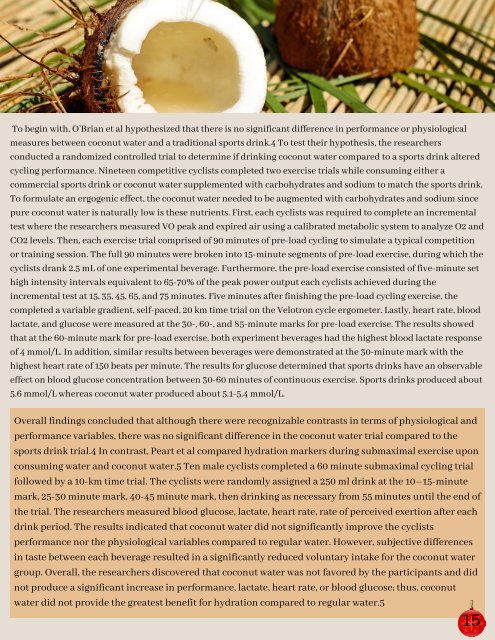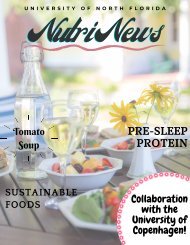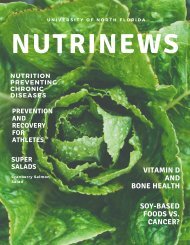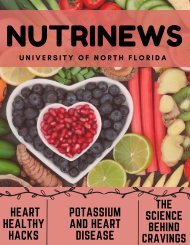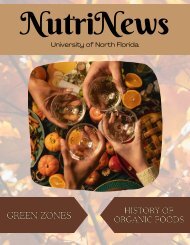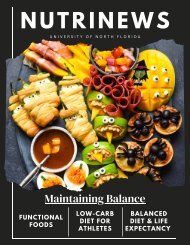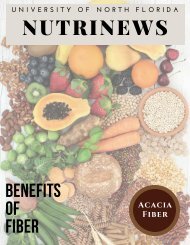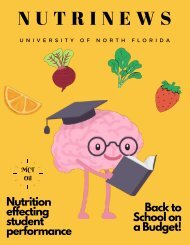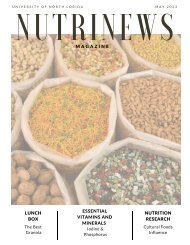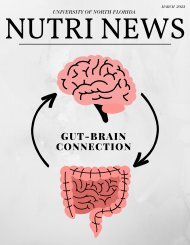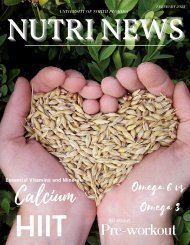December Issue 2023
You also want an ePaper? Increase the reach of your titles
YUMPU automatically turns print PDFs into web optimized ePapers that Google loves.
To begin with, O’Brian et al hypothesized that there is no significant difference in performance or physiological<br />
measures between coconut water and a traditional sports drink.4 To test their hypothesis, the researchers<br />
conducted a randomized controlled trial to determine if drinking coconut water compared to a sports drink altered<br />
cycling performance. Nineteen competitive cyclists completed two exercise trials while consuming either a<br />
commercial sports drink or coconut water supplemented with carbohydrates and sodium to match the sports drink.<br />
To formulate an ergogenic effect, the coconut water needed to be augmented with carbohydrates and sodium since<br />
pure coconut water is naturally low is these nutrients. First, each cyclists was required to complete an incremental<br />
test where the researchers measured VO peak and expired air using a calibrated metabolic system to analyze O2 and<br />
CO2 levels. Then, each exercise trial comprised of 90 minutes of pre-load cycling to simulate a typical competition<br />
or training session. The full 90 minutes were broken into 15-minute segments of pre-load exercise, during which the<br />
cyclists drank 2.5 mL of one experimental beverage. Furthermore, the pre-load exercise consisted of five-minute set<br />
high intensity intervals equivalent to 65-70% of the peak power output each cyclists achieved during the<br />
incremental test at 15, 35, 45, 65, and 75 minutes. Five minutes after finishing the pre-load cycling exercise, the<br />
completed a variable gradient, self-paced, 20 km time trial on the Velotron cycle ergometer. Lastly, heart rate, blood<br />
lactate, and glucose were measured at the 30-, 60-, and 85-minute marks for pre-load exercise. The results showed<br />
that at the 60-minute mark for pre-load exercise, both experiment beverages had the highest blood lactate response<br />
of 4 mmol/L. In addition, similar results between beverages were demonstrated at the 30-minute mark with the<br />
highest heart rate of 150 beats per minute. The results for glucose determined that sports drinks have an observable<br />
effect on blood glucose concentration between 30-60 minutes of continuous exercise. Sports drinks produced about<br />
5.6 mmol/L whereas coconut water produced about 5.1-5.4 mmol/L.<br />
Overall findings concluded that although there were recognizable contrasts in terms of physiological and<br />
performance variables, there was no significant difference in the coconut water trial compared to the<br />
sports drink trial.4 In contrast, Peart et al compared hydration markers during submaximal exercise upon<br />
consuming water and coconut water.5 Ten male cyclists completed a 60 minute submaximal cycling trial<br />
followed by a 10-km time trial. The cyclists were randomly assigned a 250 ml drink at the 10–15-minute<br />
mark, 25-30 minute mark, 40-45 minute mark, then drinking as necessary from 55 minutes until the end of<br />
the trial. The researchers measured blood glucose, lactate, heart rate, rate of perceived exertion after each<br />
drink period. The results indicated that coconut water did not significantly improve the cyclists<br />
performance nor the physiological variables compared to regular water. However, subjective differences<br />
in taste between each beverage resulted in a significantly reduced voluntary intake for the coconut water<br />
group. Overall, the researchers discovered that coconut water was not favored by the participants and did<br />
not produce a significant increase in performance, lactate, heart rate, or blood glucose; thus, coconut<br />
water did not provide the greatest benefit for hydration compared to regular water.5<br />
15


